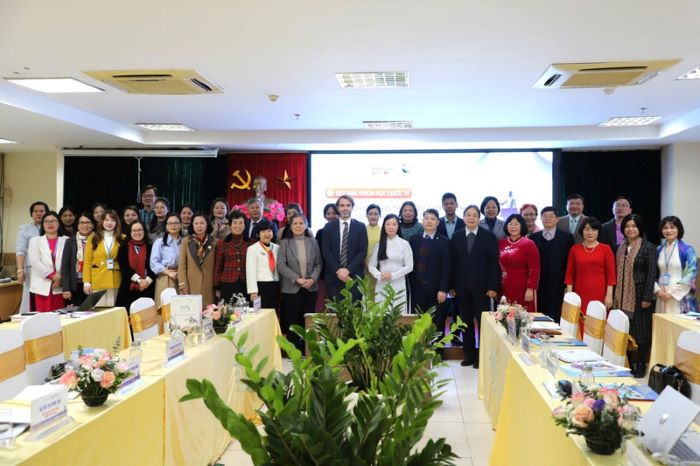A life with Vietnam
Known to her friends in Vietnam as Thao, Rosemary’s association with Vietnam started more than 20 years ago. At that time, as a new university graduate, she wished to travel to Europe to learn more about her roots as a person with the Polish last name of Kacoroski. But with no money and no chance of finding job in a country that was then behind the iron curtain, it was not likely for her to move forward that hope.
A sudden call from a friend in Hong Kong changed everything. “It wasn’t what I had hoped for. But well, I got chance to go to a foreign country and could make some money by teaching English to Vietnamese refugees”.
Rosemary first planned to stay there for only one year. But she kept delaying her departure, and when she left that plan had been dragged on to 6 years.
Her students were Vietnamese boat people. They were all waiting to go to another country. Rosemary picked up another interest – learning Vietnamese. At first, it was just for fun. Her students then became her teachers.
“It was so funny that those people came from Quang Ninh and pronounced N as L. I started, of course, wondering why they told me to pronounce Haloi and Vietlam instead of Hanoi Vietnam” Rosemary recalled. “It wasn't until I was studying in Hanoi that I realized I had been speaking Vietnamese like a hick!"
Her name was also cut short to “Rose” but in Vietnamized English it became pronounced “zo”, which in Northern Vietnamese can either mean "daughter-in-law" or "beard". Figuring that neither name suited her, she decided to change to a totally Vietnamese name “Thảo”.
Rosemary then headed for Vietnam to further improve her Vietnamese. This was in the late 80s and early 90s, when there were not many Westerners visiting the country.
In Hanoi, she was an artist, a singer, a film actress and anything else fun she could find to do. Rosemary was known as the first “American singer” who sang in Vietnamese on a Hanoi stage at the Gala 90 Music Festival. "It was so cheap to live here at that time, I managed to live rather a comfortable life on US $ 3000 per year.”
By this time, she had forgotton about going to Poland and had a new plan to become a professional Vietnamese translator.
Returning to America, Rosemary sat for an exam to get a translating certificate issued by the Office of the Administer of the Courts of Washington State. She translated for all kinds of proceedings, ranging from medical appointments to murder trials to everything in between. She ran her own translation company well enough to earn rather good living.
Rosemary met her husband in 1995 and gave birth to a pretty daughter in 2000. Now her professional name is Rosemary Nguyen. She also named her daughter a beautiful Vietnamese name – Nguyen Hong Ly.
Rosemary loves reading Vietnamese stories. She become interested in translating these stories into English. However, it wasn’t easy to survive on the income of a literary translator.
“If I had continued with the previous job I could have had a more comfortable life in terms of money. But I don’t need that, I just want to do something that I find interesting.”
Moving to Vietnam to reduce their cost of living, Rosemary can now concentrate on doing what she loves best.
A view
Working for Curbstone, a non profit publishing house, Rosemary has so far translated two collections of short stories from Vietnamese to English titled, “Nine stories from the Literature News”, and “ The cemetery of the Chua village” as well as contributed to numerous other collections. These stories were all written after the war.
“How did you select the stories for translation?”
“Simply if they are interesting to me”
“Why don’t you translate novels, stories written during the war time?”
“Any war would make writers who write about it subjective. Vietnam has been known to the world as a country of war. Just a few know about the country as a peaceful country as it is now. I think readers around the world want to explore a new Vietnam. That is why I prefer to introduce a modern Vietnam to the world through Vietnamese stories.”
“What do you find the hardest?”
“Translating is not easy. Vietnam has a rich culture and it is very different from Western culture. To take an example from the novel that I am working on now, the main character is a married woman whose entire contigent of female relatives – sisters, aunts, mother, grandmother – are all widows. Now, this simply wouldn't happen in America. But in Vietnam, after fighting wars for decades on their own soil, it really did happen. So in my translation I had to make it clear that the women were all war widows, otherwise the American reader would likely consider it a tear-jerking exaggeration on the author's part. .”
“I am lucky because my husband is Vietnamese and he has supported me a lot in doing my job”
Rosemary and her family have settled down in Hanoi for six months now. She is working on translating the award-winning novel "An Insignificant Family" by the author Da Ngan.







